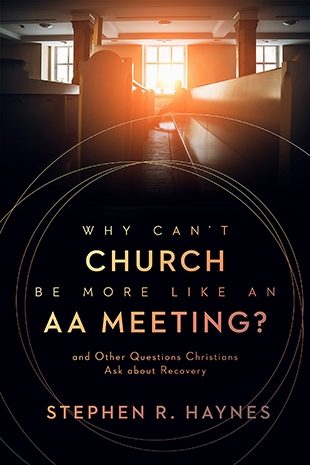We remember times long ago when mission churches started out meeting in bowling hall, in empty school classrooms, or even around tables in a local restaurant. Going to church in those days was an adventure as people worshipped and worked together, putting more time and energy into building up a small community rather than a physical building.
These memories emerged as we read Stephen R. Haynes's book Why Can't Church Be More Like an AA Meeting? The author is a professor of religious studies at Rhodes College, adjunct professor of recovery ministry at Fuller Seminary, and theologian-in-residence at Idlewild Presbyterian Church in Memphis, Tennessee. As everyone knows, there has been an ongoing evacuation of churches as large numbers of youth and middle-ages seekers look elsewhere for meaning, purpose, openness, and hospitality.
With a firm grasp of resources about the history and changes over time in Alcoholics Anonymous and many other 12-Step fellowships, Haynes reveals how these groups have grown thanks to "the scourge of addiction and the promise of recovery." He notes specific aspects of the "recovery ethos" that have been noted by Christian writers:
- people present themselves in their brokenness
- people are desperate and in search of transformation
- AA's atmosphere of acceptance and belonging
- AA's informality and lack of hierarchy
- AA's implicit understanding of human nature
In recovery himself, Haynes brings insight, experience, and authenticity to his answers to key questions often raised about Twelve-Steps programs, including: Is Recovery Anti-Christian? Is Recovery Biblical? Can Christians Embrace Recovery? What Does the Church Bring to Recovery? Does Twelve-Step Recovery Work? He identifies key "embracers" of the movement from Evangelical, Mainline, and Roman Catholic churches. Among the practices the church has given AA, he mentions gathering, prayer, meditation, worship, training, support, and duplication.
Haynes concludes that AA and Christian communities can exchange ideas, ideals, and gifts in times like this when addiction, shame, and narcissism are so rampant. Both groups can model acceptance and spiritual transformation.
GOING DEEPER
We recognized Stephen R. Haynes's commentary on the spiritual dimensions of 12-Step Fellowships as also being noted in the following books:
Breathing Under Water: Spirituality and the Twelve Steps by Richard Rohr
Thirst: God and the Alcoholic Experience by James B. Nelson
The Awakened Heart: Opening Yourself to the Love You Need by Gerald G. May
Divine Therapy & Addiction by Thomas Keating
Holy Hunger by Margaret Bullitt-Jonas
Recovery: The Sacred Art by Rami Shapiro
Seeds of Grace: Reflections on the Spirituality of Alcoholics Anonymous by Molly Monahan
